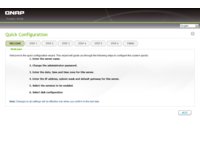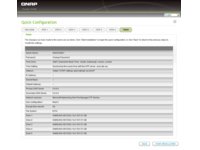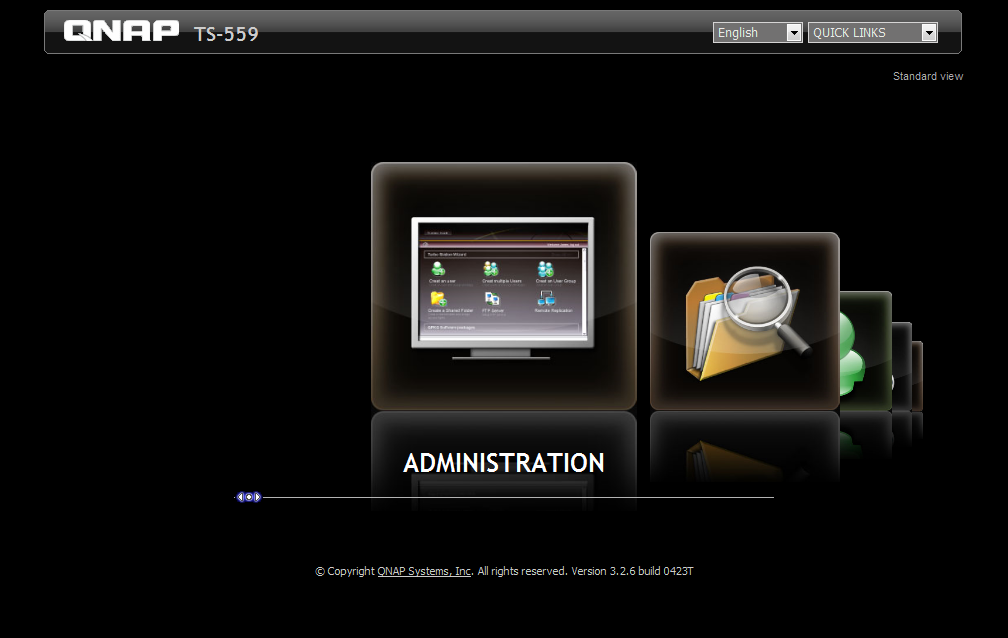Qnap TS-559 Pro+: Familiar Network Storage With A New CPU
It’s a good idea to use two CPU cores to speed up multiple drives in RAID 5 or 6 arrays and it’s even better to increase clock speeds. We put Qnap's TS-559 Pro+ with an Atom D525 dual-core CPU to the test: is it any faster than devices with Atom D510?
A Glance At The Software And Specifications
As with the housing, Qnap's software displays no weaknesses and demonstrates what a modern NAS device can do. A detailed discussion of its functionality is beyond the scope of this article, but we’ll provide a quick summary: the functions leave almost nothing to be desired. Experienced users should accomplish the rapid configuration through a Web browser in a few minutes.
For inexperienced users, the Web interface of a new TS-559 Pro+ presents an installation wizard that guides the user in six steps through the initial configuration. The name of the NAS server and the IP address are entered here along with indications of which network, file, multimedia, and Web server services are to be activated. The Qnap TS-559 Pro+ accommodates heterogeneous networks and supports access to AppleTalk and NFS via SMB/CIFS. Network users can access content over an iTunes or UPnP multimedia server and Web presence is enabled by the integrated LAMP servers (Linux, Apache, MySQL, and PHP). The decision whether or not to activate only the Apache server or the MySQL server is left to the user.


The firmware supports RAID 0, 1, 5, and 6, of which the latter two can be operated with a spare drive in a hot-swap configuration. For professionals and businesses, it is possible to integrate the Qnap TS-559 Pro+ with a network as an iSCSI device. The TS-559 Pro+ supports the virtualization solutions VMware vSphere (ESX/ESXi 4.0 and higher), Citrix XenServer (5.6), and Windows Server 2008 Hyper-V.
If you want to test the administrative interface before buying the device, we recommend taking a look at the live demo provided by Qnap. There you can use your own data to try out the system prior to purchasing it, including the administration interface, the Web file manager, as well as the download and multimedia stations.
Brief overview of specifications
| Processor | Intel Atom D525 1.8 GHz dual core processor |
|---|---|
| RAM | 1 GB DDR2 RAM |
| Flash-Drive | 512 MB DOM |
| Hard Drive | 5 x 2.5/3.5" SATA |
| HDD Bays | Five bays, connectable with hot-swap capability |
| RAID Modes | RAID 0, 1, 5, 5 + hot-swap, 6, 6 + hotswap |
| File System | ext3, ext4 (internal hard drives)ext3, ext4, NTFS, FAT32, HFS+ (external hard drives) |
| LAN Connections | 2 x gigabit Ethernet |
| USB | 5 x USB 2.0 (front: 1; rear: 4) |
| eSATA | 2 x eSATA (rear) |
| LCD Display | Mono-LCD-Display with Enter-/Select-buttons for initial configuration |
| Dimensions | 185 mm (H) x 210 mm (W) x 235 mm (D) |
| Weight | Empty housing: 5.1 kg (11.25 lbs) |
| Other | VGA connection |
| Fan | Temperature-controlled fan, 120 mm |
Get Tom's Hardware's best news and in-depth reviews, straight to your inbox.
Current page: A Glance At The Software And Specifications
Prev Page Sticking With What Works Next Page Test System And Power Consumption-
hmp_goose I remember a time when teh Internet was going to have hyperlinks embedded in articles for clowns like me to look stuff up with.Reply
C'mon! I'm a knuckle-dragging FPS-player: I don't know what "SMB/CIFS protocols" stands for, let alone good for! Isn't there at lest a related article? -
barmaley Ok, I don't get it. Can someone explain to me why this $1000 device that comes with no storage is better than a $500 Linux box you can build yourself that will do everything this does and more plus it will come with tons of storage too...Reply -
sharpless78 barmaleyOk, I don't get it. Can someone explain to me why this $1000 device that comes with no storage is better than a $500 Linux box you can build yourself that will do everything this does and more plus it will come with tons of storage too...Reply
Ease of use. Very few users have the time, will and knowledge to build a NAS. -
aaron88_7 barmaleyOk, I don't get it. Can someone explain to me why this $1000 device that comes with no storage is better than a $500 Linux box you can build yourself that will do everything this does and more plus it will come with tons of storage too...First off, it isn't better than a $500 Linux box. Linux requires Linux knowledge and you have to provide the software you need yourself - that costs small businesses money. This also offers failover and load balancing with its dual NIC card that you wouldn't have in a $500 Linux box.Reply
The main thing is ease of installation. You don't need a highly technical person to get this box up and running and quickly backing up your companies data, whereas a Linux machine will require additional staff that a small business normally would not have on hand and have to pay to come onsite.
For $1000 I'd like one just to play around with myself, though it clearly is not targeted for home users. -
dealcorn I am not aware of any 5 bay hot swap itx case that could be used as a basis for a diy project with comparable functionality. Chenbro can get you to 4 at the cost of no pcie support. No pcie means no esata with a supermicro atom itx board.Reply
There are ways to go with ATX cases, but that is not really comparable. -
radiumburn but with that $500 linux box you will force yourself to learn something.. and in the end isn't it all about the pursuit of knowledge! haha well I admin a few linux servers so I'd save the cash and make my own for myself/work instead. On that note if you want I will make them for $999 and free shipping with initial phone setup!!! save a dollar!Reply -
a-nano-moose How can you compare them when you are using different hard drives than the earlier tests?Reply -
cknobman Sharpless78Ease of use. Very few users have the time, will and knowledge to build a NAS.Reply
A NAS is a computer. Heck you can even build a PC put Windows 7/XP Home edition on it and turn it into a NAS all for ~$500 (and thats even with 2tb storage in raid 1, heck that is what I have done and it works great and I am even using a low power AMD CPU that is powerful enough to actually be useful rather than a pathetic atom cpu).
There is no ease of use factor or amount of time on earth that is worth $500+ dollars.

